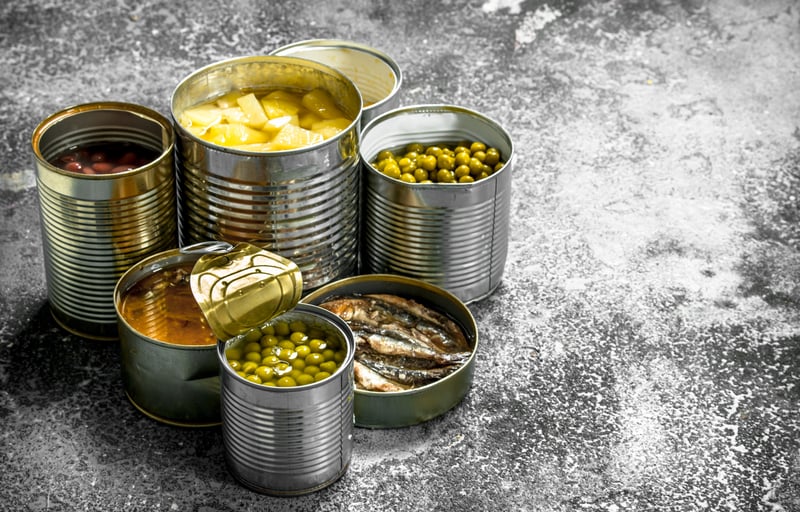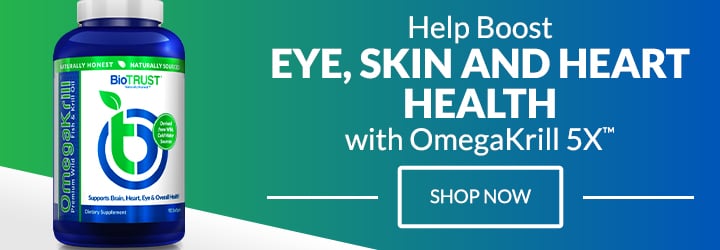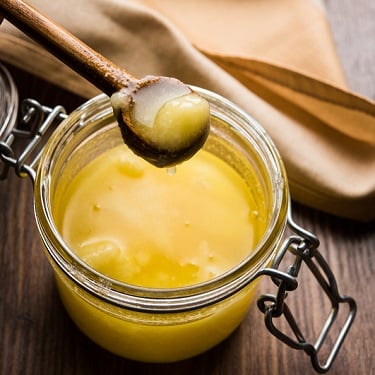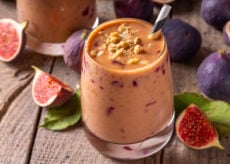The 6 Healthiest Canned Foods to Keep in Your Pantry

Canned foods have long been labeled as last resort alternatives to fresh or frozen foods. This has mainly been due to the bad reputation they gained for being highly processed and high in sodium. However, despite the saying “fresh is best,” many canned foods can be highly nutritious and make for an easy option when putting together a healthy meal. Beyond this, canned foods are pantry staples that are assessable and affordable, making them easy to stock up on.
It goes without saying that some canned foods are better than others. To help navigate through the aisle, we made a list of the 6 healthiest canned foods to keep in your pantry.
6 Healthiest Canned Foods
1. Tomatoes
Canned tomatoes are loaded with the nutrient lycopene. This is a member of the carotenoid family that may help battle against premature cognitive decline, protect skin from sun damage, and lower the risk for some forms of cancer. When it comes to the lycopene found in tomatoes, it’s worth noting that canned tomatoes are preserved using heat, which increases the bioavailability of the antioxidant. That is, the heating process makes the lycopene more accessible to promote those health rewards. In addition, vitamin C is another nutrient found in canned tomatoes. Plus, vitamin C enhances our absorption of iron from other plant-based foods such as beans.
Most importantly, canned tomatoes are full of delicious flavor all year round. This contrasts with out-of-season fresh options, which are frequently second rate. Unfortunately, some canned versions also come with added sugar and salt. But it’s relatively easy to limit this problem by watching labels and finding those with no sugar listed and lower sodium levels listed on the nutrition panel. Likewise, choose organic canned tomatoes when possible, and consider the packaging, opting for glass jars, aseptic boxes, or “BPA-free” cans.
2. Beans
From black to garbanzo to pinto to red kidney to lima and more, canned beans are most often thought of as a pantry staple. This is because they can save you big on cooking time over dried beans as they don’t require any soaking beforehand. Plus, beans are healthy sources of protein, fiber, and carbohydrates and can be easily added to everything from soups to salads.
Black beans in particular are packed full of essential vitamins and minerals, including iron, folate, magnesium, and phosphorus. What’s more, canned black beans contain about 15 grams of protein in a single-cup serving. As a pro tip, draining canned black beans and rinsing them well will send a high proportion of the gas-producing compounds down the drain, and it will also reduce the sodium content.
3. Oysters
Often overlooked, canned oysters deliver numerous nutritional benefits. For instance, they offer more potassium, phosphorous, and magnesium than raw oysters. Plus, unlike raw oysters, they provide vitamin C, due to the acid added during canning. Even more, each can of oysters contains more than the daily need for vitamin B12, copper, and immune-boosting zinc. Canned oysters are also a rich source of iron and provide a decent amount of selenium.
4. Pumpkin
Canned pumpkin puree is a perfect way to get your fall-time favorite food in your diet all year round. Pumpkin is a great source of beta-carotene, which the body converts into vitamin A and is needed to maintain eye, immune, and bone health. Pumpkin puree is also high in vitamin C and fiber (with 3 grams per half cup). Further, canned pumpkin makes a great substitute for butter in baking. Just be sure to steer clear of canned pumpkin pie mix, which is loaded with sugar and other added ingredients.
5. Fish
Fresh fish is one of the healthiest foods to eat. While it is delicious, it can get expensive, as well as spoil quickly. Canned fish like salmon and tuna can be great for a quick, high-protein meal. Not only does canned salmon last longer, but you’ll reap all the same nutritional benefits as with fresh, as it’s rich in vitamins like D and B12.
That said, when buying canned fish, it is important to pay attention to quality. When selecting canned fish, look for options that are organic or wild caught, packaged in water, with no salt added. Similarly, when shopping for canned tuna, opt for light tuna, which generally comes from smaller, less mercury contaminated breeds of tuna.
6. Spinach
If you are like me and your fresh spinach always goes bad before you get a chance to eat it all, canned spinach may be the way to go. Canned spinach even has more vitamin C per serving than fresh spinach. Moreover, lutein, a nutrient found in green vegetables such as spinach, is not damaged in the canning process, making canned spinach as beneficial for vision as fresh spinach.
Worst Canned Foods
While there are several great choices when it comes to canned items, like the foods listed above, there are also some choices that should be limited if not avoided altogether. For example…
1. Soups & Pasta
Although a convenient and quick meal solution, pre-packaged canned soups and pastas should be avoided when possible. This is because they may contain large amounts of sodium, which may raise your risk of conditions like high blood pressure or heart disease. By making homemade versions of these foods, you can enjoy greater nutrient density as well as control the sodium content. (Plus, homemade versions just taste so much better.)
2. Fruits in Syrup
When choosing canned fruits, select those canned only in water or their own juice, since they contain less sugar than those canned in syrup. High sugar intake is associated with hyperactivity, brain deficits, and weight gain and obesity.
In short, healthy eating doesn’t need to always involve extra prep, planning, and trips to the grocery store. This list of healthiest canned foods are an inexpensive, quick, and nutritious way to benefit your health in line with your goals.




 US Doctor: "Eating This Every Day Can Snap You Into Ketosis"
US Doctor: "Eating This Every Day Can Snap You Into Ketosis" 3 Key Nutrients to Help Lubricate Your "Tin Man" Joints
3 Key Nutrients to Help Lubricate Your "Tin Man" Joints AVOID Plant-Based Protein Powders (unless...)
AVOID Plant-Based Protein Powders (unless...)

